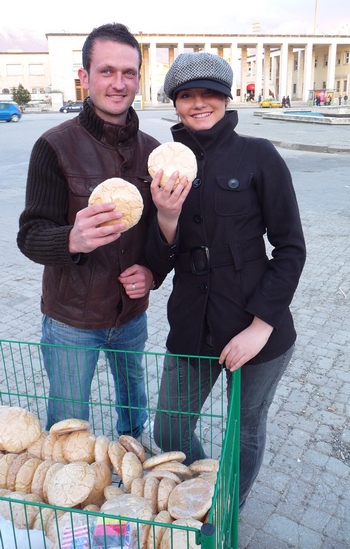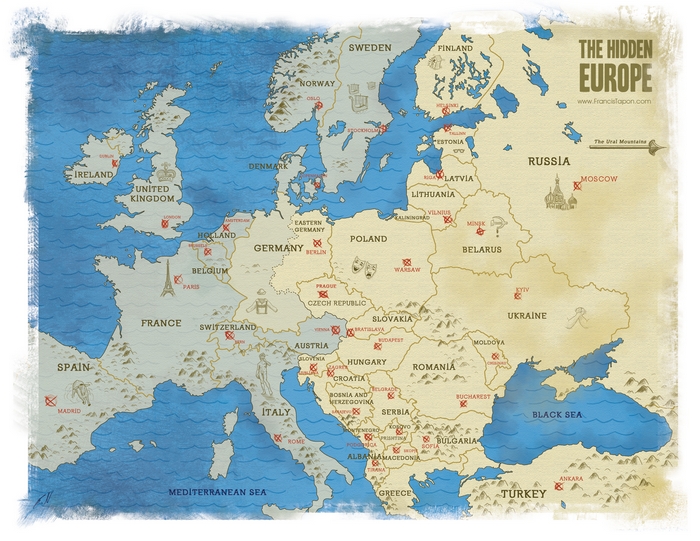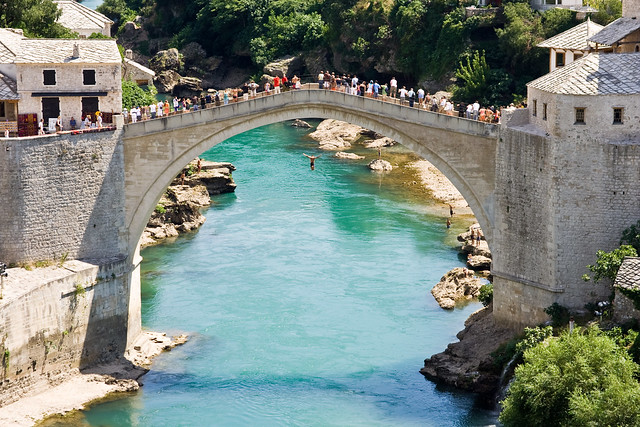Eastern Europe
Exploring the Hidden Europe in 2004 and 2008-2011
In 2004, I visited all 25 countries in Eastern Europe. You'll find the blog entries from that trip here. In 2008-2011, I returned to see what had changed since that time. With these two visits, five years apart, I accumulated enough material for my 750-page book, The Hidden Europe: What Eastern Europeans Can Teach Us.
This blog now has many excerpts from The Hidden Europe. But who the hell reads anymore? Just look at the best photos from Eastern Europe!
This map reflects how I define Eastern Europe. Eastern Europeans love to deny that they're in Eastern Europe. I tackle how and why I define Eastern Europe the way I do in the Introduction of The Hidden Europe.
Places I saw and recommend in Albania: Drin River, Albanian Alps, Butrint, and the southern beaches.
What Albania and Finland have in common

There is a world of difference between Finland and Albania, but they both call their country something that doesn’t sound like what the rest of the world calls them. As we saw in the chapter on Finland, Finns call their country Suomi (while nearly all other countries call it something that sounds like “Finland”).
Albania has the same deal: the Italian, Indonesian, Norwegian, Polish, Portuguese, Romanian, and Spanish languages call the Albanian country Albania. Other languages have a similar phonetic sound: Albanie (French); албания “Albaniya” (Russian, Bulgarian); Albània (Catalan); “Aherbainieya” (Chinese); Albanija (Balkanian, Lithuanian, Slovenian); Albánie (Czech); Albanien (Danish, Swedish, German); Albanië (Dutch); Albānija (Latvian); Albánsko (Slovak); αλβανία (Greek); Albanya (Filipino); and 알바니아 “Albania” (Korean).
So what do Albanians call their country? Shqipëria.
Yeah, I didn’t expect that either. They call their language Shqip.
Why did all that happen? Nobody knows. First, the origin of the Albanian term is an enigma. There are few clues: in the second century BC, Polybius mentioned the Arbon tribe. About 400 years later, Ptolemy marked the city of Albanopolis near modern-day Durrës in Albania. There are other ideas, but nothing conclusive.
Second, scholars can’t agree on where Shqipëria comes from either. One theory is that it comes from the verb shqipoj, implying one who understands.
The other theory is that Shqipëria comes from shqipojnë (eagle). Albanians have been using the double-headed eagle symbol for at least 600 years. The Albanian flag, one of the coolest ones in the world, has a red background and a black two-headed eagle on it.
Where to go in Montenegro
Places I saw and recommend in Montenegro: Kotor, Budva, Perast, Lovćen's Mausoleum, and Durmitor National Park.
The highest compliment you can give a place is to say, "I want to buy a house here." It's more meaningful than saying "I want to live here," because buying a house is a deeper commitment than renting. These were my thoughts as I walked through the romantic streets of Kotor, Montenegro.
Montenegro is smaller than Connecticut, but it has Alpine scenery, deep canyons, coastal fjords, old Venetian-style towns, and a sparsely vegetated, limestone mountain range that plummets into the azure Adriatic Sea. Montenegro has it all. But it was Kotor, a town which lies in the largest fjord in southern Europe, that stole my heart.
Where to go in Bosnia and Herzegovina
Places I saw and recommend in Bosnia and Herzegovina: Sarajevo, Mostar, and the southern mountains around Herzegovina.
The opening of the Bosnia and Herzegovina chapter in The Hidden Europe
Bosnia and Herzegovina is Europe's most complicated country. That's ironic, because it's filled with Europe's simplest people.
Just how complicated is it? Try to understand this: Bosnia and Herzegovina is a bit smaller than West Virginia, but has three religions, three ethnic groups, yet one language (some claim that there are three languages). However, the country is not divided in three regions, but in two. Yet the exact definition of those two regions depends on what you're talking about. The two-way split can either be between the Bosnia region and the Herzegovina region or between the Republika Srpska and the Federation of Bosnia and Herzegovina. Oh, but then there's the tiny autonomous Brčko District, which you might call a third region. The three ethnic groups elect a President for a four-year term; each President controls the country for an eight-month period before handing power over to one of the other two Presidents. They rotate among themselves six times. On the other hand, none of that matters because there's this third guy, a foreigner called the High Representative, who has king-like powers.
Nothing is simple in the Balkans. — David Owen, author of two failed peace attempts during the Bosnian War
- Three Sights to See in Prague
- Serbia
- Croatia
- Slovenia
- Hungary
- Slovakia
- Czechia
- Eastern Germany
- Poland
- Belarus
- Lithuania
- Latvia
- Finland
- Counting to 10 in Estonian and four other languages
- Finland: home to the smartest kids in the world
- 10 facts about Estonia that you may not know
- Best photos
- Ahvenanmaa, but please call it Aland
- Tallinn, Estonia Tour - Bronze Soldier and Old Town
- The World's Most Dangerous and Extreme Backpacking
Your comment will be deleted if:
- It doesn't add value. (So don't just say, "Nice post!")
- You use a fake name, like "Cheap Hotels."
- You embed a self-serving link in your comment.






